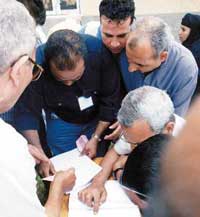Egypt's NCHR Symposium: Elimination Of Religion From ID Cards
 In the daily Egyptian newspaper 'Nahdat Misr' (Rise & Renaissance of Egypt), an article was published on 11 July 2006, announcing that Egypt's National Council for Human Rights (NCHR) has scheduled a symposium for early August 2006, to research the elimination of religion from Egypt's new national ID card system. The Council invited a number of leading thinkers, writers, and officials from the Ministry of Religious Endowment, Ministry of Interior, and the Church to attend this symposium and workshop.
In the daily Egyptian newspaper 'Nahdat Misr' (Rise & Renaissance of Egypt), an article was published on 11 July 2006, announcing that Egypt's National Council for Human Rights (NCHR) has scheduled a symposium for early August 2006, to research the elimination of religion from Egypt's new national ID card system. The Council invited a number of leading thinkers, writers, and officials from the Ministry of Religious Endowment, Ministry of Interior, and the Church to attend this symposium and workshop.
The intention of the workshop/symposium is to have its participants research the opinions of all those concerned with the controversial issue of religion on ID cards. They will also research its implications regarding citizenship rights and its effects on Egypt. Another question to be addressed will be whether or not the Egyptian society would support the elimination of religion as an item on National ID Cards. Ambassador Mokhles Kotb, the Council's Secretary General, stated that "the symposium will discuss several proposals introduced by its 'Citizenship Committee' regarding the elimination of the section on religion from the ID Card based on its study of the statements on civil rights provided in the Egyptian constitution and laws. Also the need to implement these guarantees in form, which would conform to the principles of human rights and the intentional standards regarding such principles."
Ambassador Mokhles Kotb, the Council's Secretary General, stated that "the symposium will discuss several proposals introduced by its 'Citizenship Committee' regarding the elimination of the section on religion from the ID Card based on its study of the statements on civil rights provided in the Egyptian constitution and laws. Also the need to implement these guarantees in form, which would conform to the principles of human rights and the intentional standards regarding such principles." Eleven more articles appeared in the same newspaper on 13 July 2006 discussing this important issue. The majority of the articles were supportive of the move to eliminate religion from ID Cards pointing out several benefits from doing so, such as: 1) reduction of discrimination, 2) not submitting to Islamic fundamentalism, 3) first step before several other steps in the direction of placing Egypt among modern countries that do not discriminate against their citizens because of their religious differences, 4) compliance with the constitution rather than submission to the interests of religious biases, 5) not having religion on ID cards should not cause problems with civil status matters, such as in marriage, divorce and birth certificates, 6) eliminating religion from ID cards may also necessitate the elimination of Article Two of the Egyptian Constitution stating that "the principal source of legislation is Islamic Jurisprudence", 7) there may not be a reason for eliminating this item as long as all religions are recognized, including Christian, Muslim, Jewish, Baha'i, and even Buddhist, as ordained in the Koran that there should be freedom of belief, stating "you have your religion, and I have my religion", 8) removal of religion from ID cards would admit Egypt into the modern age of democracy.
Eleven more articles appeared in the same newspaper on 13 July 2006 discussing this important issue. The majority of the articles were supportive of the move to eliminate religion from ID Cards pointing out several benefits from doing so, such as: 1) reduction of discrimination, 2) not submitting to Islamic fundamentalism, 3) first step before several other steps in the direction of placing Egypt among modern countries that do not discriminate against their citizens because of their religious differences, 4) compliance with the constitution rather than submission to the interests of religious biases, 5) not having religion on ID cards should not cause problems with civil status matters, such as in marriage, divorce and birth certificates, 6) eliminating religion from ID cards may also necessitate the elimination of Article Two of the Egyptian Constitution stating that "the principal source of legislation is Islamic Jurisprudence", 7) there may not be a reason for eliminating this item as long as all religions are recognized, including Christian, Muslim, Jewish, Baha'i, and even Buddhist, as ordained in the Koran that there should be freedom of belief, stating "you have your religion, and I have my religion", 8) removal of religion from ID cards would admit Egypt into the modern age of democracy. The few opposing the move provided no legitimate arguments, but stated: 1) that it is a conspiracy by America and expatriate Copts opposed to Egypt, 2) if religion is removed, the Egyptian public will not remain silent as Egypt is an Islamic country and will remain so, and it does respect other religious beliefs. However, "Eliminating religion from ID cards would allow apostates to escape their deserved punishment."
The few opposing the move provided no legitimate arguments, but stated: 1) that it is a conspiracy by America and expatriate Copts opposed to Egypt, 2) if religion is removed, the Egyptian public will not remain silent as Egypt is an Islamic country and will remain so, and it does respect other religious beliefs. However, "Eliminating religion from ID cards would allow apostates to escape their deserved punishment."
It is encouraging to see this forward move towards reason and progress, and hopefully such a symposium will become a forum for tolerance and understanding. If a person's religion, however, must be documented somewhere, then why not leave that to the authorities of the religion to whom the person belongs to provide such documentation? This process must be independent of the National ID Card system.
For further reading regarding the issue of Religion and ID Cards, refer to this previous post.











This is blog is very illuminating for me. I used to think of Egypt as a very progressive Islamic country. Regarding this post's topic, "I don't believe" the symposium in itself, in the short run will have much, if any success. "I believe" that this issue is connected to Islamic extremism. That darkness in the Islamic mullas' hearts' is tied to an assertion of power in Iran, with links to Iraq on one side and Hizbollah's low level war with Israel on the other. The ripple effects will be fed into Egyptian society at the extremes. The Bahais will be for Egyptians the most accessible scapegoats. How long will the war with Israel last???? God only knows. I don't think Iran wants to confront Israel directly, I don't think they really wanted Hizbollah to start up yet. But it has started and the worm will turn as much as it can. All this is based on my "vain imaginings and idle imagination" I have no real basis for any of this ;-)
ReplyDeleteThank you for your insightful remarks. The symposium is intended to bring together all parties to the question at hand. As is obvious, the issue of religion on ID cards affects several religions, not only Baha'is, and does have significant repercussions on other aspects of the society. It will also bring to light the need for Egypt to join the free world in abolishing tools that could be instrumental in promoting discriminatory practices.
ReplyDeleteAs to the other question, I think it is a much larger and complex one, which is beyond the scope of this blog.
Thought you would be interested in this in the San Francisco Chronicle:
ReplyDeletehttp://www.sfgate.com/cgi-bin/article.cgi?f=/c/a/2006/07/15/DDGM3JUQ3C1.DTL
Excerpt:
"Human rights activists also point out the government's refusal to recognize the Baha'i faith, which began in Persia in the 19th century and has 6 million members but only 2,000 in Egypt. Its members are refused death certificates, and their children are often threatened with expulsion from school."
"They have had more problems since the Islamization process," says Hossam Bahgat, director of Egyptian Initiative for Personal Rights. "They are seen as apostates, looked at with suspicion since the religion has its roots in Iran and has holy places in Israel."
Egypt is an interesting society.
ReplyDeleteI was greatly influenced in elementary school by a book in the library about King Tut. Believe me, in a small town in North Georgia of about 9,000 (and 63 churches in the phone book ;-) a book about the golden tomb furnishings, the statuary, the Valley of the Kings..
Then in late high school I read the Alexandrian Quartet From reading those books 3 or 4 times I wanted to be a writer (well I also wanted to be a jet pilot too ;-)
Egypt graduates an incredible number of students who can't find jobs. So, I think a huge number must emmigrate every year. And the population is young and fertile. "Islamization" is a curious term. Egypt has been an Islamic country for a long time, much longer than the US has been Christian;-) I suppose it is the hope of democracy that has made "Islamization" such a dangerous word.
That book by Lawrence Durrell clearly reflects life in Alexandria and some other parts of Egypt just as it was in the 1940s and 1950s. Those days are long gone!
ReplyDeleteSix years ago, in a visit to Sharm el-Sheikh on the Red Sea, I met a young shop owner. When the question of his educational background came up, it was surprising to learn that he held a law degree, but could not find decent employment as an attorney. This would be unheard of in Egypt before, when a professional university degree had always guaranteed appropriate employment befitting of the education received. This is not to belittle shop owners, but why go through law school if one can’t use his or her education in that specific field…just like medical graduates driving taxis!
I translated parts of this article to Portuguese and published it in my blog.
ReplyDelete